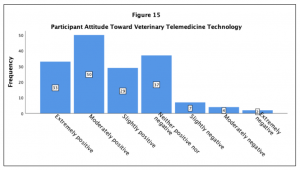The discipline of veterinary medicine is witnessing some highly exhilarating transformations at present.
These positive changes are largely being executed due to the rapid scientific and technological innovations that enable practitioners to make faster diagnoses, determine more accurate prognoses, and treat our four-legged friends more effectively.
This is clearly evident in the fact that the employment of veterinary technicians and technologists is estimated to grow by 16% in a mere span of 10 years (2019-2029), much faster than the average for all other occupations.
Leveraging state-of-the-art tech advancements is increasingly proving its potential in making care delivery more streamlined and helping veterinary practitioners ameliorate patient outcomes at a macro level.
1) Mobile Apps Help Streamline Communication with Pet Parents
Mobile applications (both Android and iOS) have produced a strong communication channel between patients and their care providers. However, the advantages that come alongside the use of mobile apps in healthcare aren’t limited to strengthening communication alone.
One recent article from Arkenea, emphasizes how mobile apps have revolutionized care delivery for good:
“Healthcare mobile applications are actively contributing to improved patient outcomes while improving on the accessibility and convenience to streamline delivery of medical services.”
Some notable benefits of developing a mobile app for your veterinary practice are:
- Brand Endorsement: having a mobile app for your practice is one of the most sought-after methods to get your brand the exposure it requires to grow. The app not only features your brand, but it also makes your practice more approachable to patients.
- Streamlining Patient Communication: a mobile app can streamline your patient communication since it presents a sophisticated yet effective blend of vital features such as push notifications, email integration, postcards and text messaging.
- Greater Time and Cost Savings: your practice will no longer have to stick to deadlines and invest in less effective tools once you start using a mobile app. With a considerably fewer number of patients calling in and the elimination of potential errors through digital appointments, your staff will have more time on hand to focus on other crucial tasks that directly contribute toward increasing your practice’s bottom line.
- Practice Analysis: Through means of the innumerable dashboards and insights produced on mobile apps, vets can easily monitor appointments, channels, refills, and delivery performance. Also, they can use these platforms to view how compliant their practice is.
- Appointment Scheduling: The extraordinary technical support that comes alongside the development of mobile apps mitigates possible errors through digital appointment scheduling and refills. With these apps, vets can communicate appointment confirmations via a number of effective modes such as text messages, emails, postcards, push notifications, etc. An optional ‘Direct Booking’ feature can also be added to the patient-facing interface of your app to make the entire process more seamless.
Apart from the ones mentioned above, there are many other benefits of using mobile app technology for your practice. It will require a little initial investment from your side, but generate huge returns in the long run and strengthen your relationship with pet parents.
2) Telemedicine Improves Access to Anytime Care
This ‘digital first’ way of thinking has swiftly expanded to all parts of our lives. As our healthcare services extend their digital capabilities, virtual services – known as ‘veterinary telemedicine’ in the case of our four-legged friends – are slowly following suit.
The University of Tennessee recently conducted a study to investigate veterinarian and consumer utilization intention and perception of telehealth in veterinary medicine. One of the survey’s findings is highlighted below:
Source: The University of Tennessee
Telemedicine adoption can prove to be extremely beneficial for physicians since patients are increasingly accepting it as an effective model of care delivery, especially during the ongoing coronavirus pandemic.
Some of the advantages of having a telemedicine platform for your veterinary practice include:
- Furnishing Better Post-Surgical Care
When any animal you’re treating undergoes an operation, post-surgical care is a factor that also goes into deciding how fast the recovery will take
place. To provide better care for such an animal, the veterinarian can easily monitor it during such a critical stage through something as easily accessible as a telemedicine app on their own smartphone.
For instance, the said veterinarian can observe the patient’s recovery by asking the owner to send images of the incision site to pick up on any abnormalities early on and keep track of the healing process. The vet can then communicate preventive measures to clients and if need be, the treatment plan can be altered accordingly.
- Functioning with Increased Flexibility and Convenience
For many veterinarians, asking owners to get their pets into the clinic is a challenge by itself; it may be that the pet is a senior animal, or terminally ill, or doesn’t enjoy the experience in general.
Telemedicine offers practitioners a way to successfully overcome these issues. For instance, vets can leverage the video calling feature within the telemedicine platform to conduct virtual consultations from the comfort of their own homes. This provides pet parents easy access to anytime care.
There are several other ways in which telemedicine adoption can prove to be advantageous for veterinarians. Embracing this state-of-the-art tech solution will not only make your life easier, but it will also have a positive impact on your business’s reputation in today’s highly competitive marketplace. Pet parents are always in awe of forward-thinking organizations.
3) Artificial Intelligence Help Derive more Value out of Patient Data
Artificial Intelligence (AI) is one technology that has brought about unprecedented changes in almost every industry in the recent past. This progressive tech innovation is evolving at a swift pace and has more to offer in veterinary medicine than we can discern right now.
Some of the ways vets can leverage artificial intelligence to improve patient outcomes and increase the bottom line of their practice include:
- Deep learning is an AI-powered technology that uses neural networks. When applied to diagnostic imaging, this tech solution functions by inspecting a bank of images to “learn” parts of the anatomy and to decide what comes under the “normal” category.
Once the algorithm can identify what’s normal and what isn’t, it precisely spots every area of suspected abnormality that needs to be probed further by the vet. This helps the care provider in deriving more value out of the data at hand and accelerates care delivery.
- AI-enabled software can automate the majority of a veterinarian’s paperwork and documentation-related tasks that usually slow down appointment scheduling.
These automated solutions can do everything right from freeing up time for the practitioner to spend with pet owners, correctly labeling, rotating, precisely measuring, and analyzing documents, creating personalized treatment plans, etc.
- Radiography is another area where AI has proved its potential in improving results. AI-powered algorithms are highly accurate in detecting patterns in imaging data. With AI-driven radiology systems, results that have accuracy rates on par with that of a live veterinary radiologist can be furnished within as little as ten minutes’ time.
AI is one tech innovation that can truly revolutionize veterinary medicine, provided that it is used at the right places. It is quickly set to become one of the most disruptive healthcare innovations of the present times. Therefore, forward-thinking veterinarians should definitely consider integrating artificial intelligence technology into their practice.
What the Future Holds
The above-mentioned technologies only scratch the surface of the endless advantages that can be provided to a veterinary practice when they are leveraged correctly.
Technological solutions can help strengthen client relationships, improve patient outcomes, and add to the success of your practice in more ways than you can think of. Moving ahead, it’s going to become one aspect that can’t be overlooked when it comes to achieving success in practice.
For now, it looks like the future of veterinary medicine is closely related to technology.
About the Author



